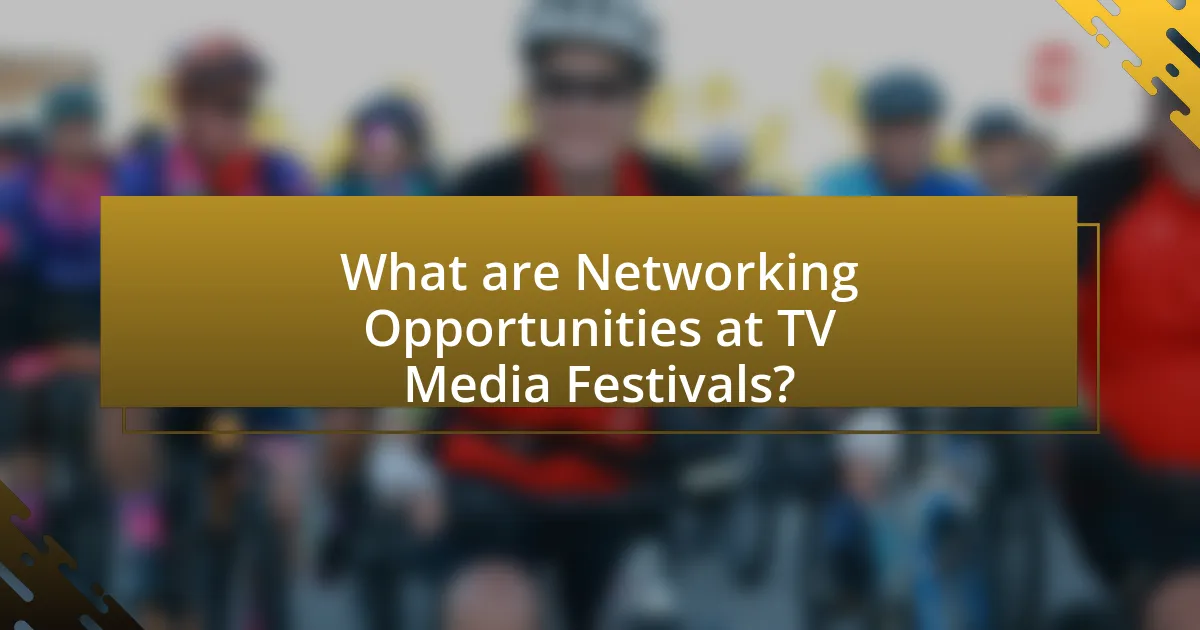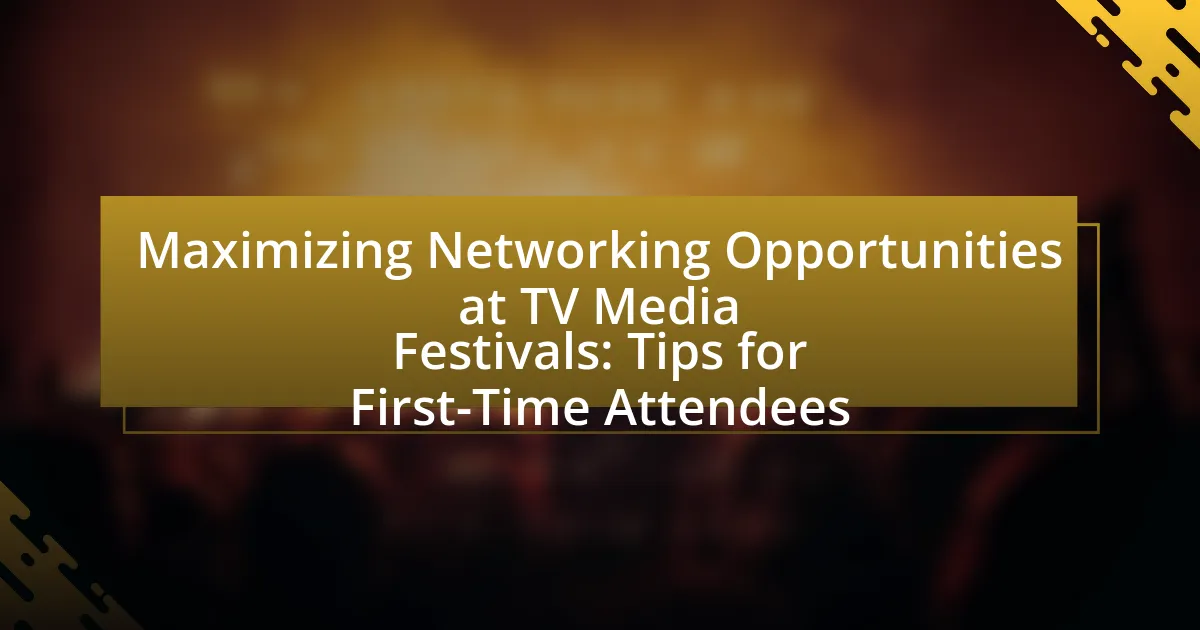The article focuses on maximizing networking opportunities at TV media festivals, specifically targeting first-time attendees. It outlines various networking formats available at these events, such as panel discussions, workshops, and informal meet-and-greet sessions, which facilitate connections among industry professionals. The importance of preparation, effective communication techniques, and follow-up strategies is emphasized to enhance career prospects in the media industry. Additionally, the article highlights common mistakes to avoid and practical tips to ensure successful networking experiences at festivals.

What are Networking Opportunities at TV Media Festivals?
Networking opportunities at TV media festivals include panel discussions, workshops, and social events designed to facilitate connections among industry professionals. These events provide attendees with the chance to meet producers, directors, and other key figures in the television industry, fostering relationships that can lead to collaborations and job opportunities. For instance, many festivals feature networking lounges or dedicated meet-and-greet sessions where participants can engage in informal conversations, share ideas, and exchange contact information. Additionally, industry-specific events often include pitch sessions, allowing creators to present their projects to potential investors or distributors, further enhancing networking potential.
Why are Networking Opportunities Important for First-Time Attendees?
Networking opportunities are crucial for first-time attendees because they facilitate connections that can lead to career advancement and collaboration. Engaging with industry professionals allows newcomers to gain insights, share experiences, and establish relationships that are essential for navigating the competitive landscape of the media industry. According to a study by the Networking Institute, 70% of jobs are found through networking, highlighting the importance of building a professional network early in one’s career. Additionally, first-time attendees can learn about industry trends and best practices directly from experienced peers, enhancing their knowledge and confidence in their field.
How can networking enhance career prospects in the media industry?
Networking enhances career prospects in the media industry by facilitating connections that can lead to job opportunities, collaborations, and mentorship. In the media sector, relationships often dictate access to roles, as many positions are filled through referrals rather than traditional applications. According to a LinkedIn survey, 85% of jobs are filled through networking, highlighting its critical role in career advancement. Additionally, networking allows professionals to stay informed about industry trends and gain insights from experienced peers, further enhancing their skill set and marketability.
What unique opportunities do TV media festivals provide for networking?
TV media festivals provide unique opportunities for networking by bringing together industry professionals, creators, and influencers in a concentrated environment. These festivals facilitate direct interactions through panels, workshops, and social events, allowing attendees to establish meaningful connections. For instance, events like the Cannes Film Festival and the Tribeca Film Festival have historically enabled filmmakers to meet potential collaborators, investors, and distributors, enhancing their professional networks. Additionally, networking lounges and informal gatherings at these festivals encourage spontaneous conversations, further expanding attendees’ contacts within the industry.
What Types of Networking Events Can Attendees Expect?
Attendees can expect various types of networking events at TV media festivals, including panel discussions, workshops, meet-and-greet sessions, and industry mixers. Panel discussions typically feature industry experts sharing insights, while workshops provide hands-on learning opportunities. Meet-and-greet sessions allow attendees to connect informally, and industry mixers facilitate networking in a relaxed environment. These events are designed to foster connections, share knowledge, and enhance professional relationships within the media industry.
What are the different formats of networking events at festivals?
Different formats of networking events at festivals include panel discussions, workshops, roundtable sessions, speed networking, and informal meet-and-greets. Panel discussions allow attendees to engage with industry experts, while workshops provide hands-on learning experiences. Roundtable sessions facilitate in-depth conversations among small groups, and speed networking offers quick, structured interactions. Informal meet-and-greets create relaxed environments for casual conversations. These formats are designed to enhance connections and foster collaboration among participants in the media industry.
How do panel discussions facilitate networking opportunities?
Panel discussions facilitate networking opportunities by bringing together industry professionals, experts, and attendees in a structured environment that encourages interaction. During these discussions, participants can engage in dialogue, ask questions, and share insights, which fosters connections among individuals with similar interests or goals. Research indicates that 70% of professionals find networking at events like panel discussions to be beneficial for career advancement, as they provide a platform for exchanging ideas and establishing relationships that can lead to future collaborations or job opportunities.
How Can First-Time Attendees Prepare for Networking?
First-time attendees can prepare for networking by researching the event and its participants in advance. Understanding the key speakers, panelists, and other attendees allows newcomers to identify potential connections and tailor their conversations. Additionally, practicing an elevator pitch helps attendees succinctly communicate their background and interests, making interactions more effective. According to a study by the Harvard Business Review, effective networking can lead to increased job opportunities and professional growth, emphasizing the importance of preparation in maximizing networking potential.
What research should attendees conduct before the festival?
Attendees should conduct research on the festival’s schedule, key speakers, and networking events. Understanding the festival’s agenda allows attendees to prioritize sessions that align with their interests and professional goals. Additionally, researching key speakers provides insights into their backgrounds and expertise, enabling attendees to engage in meaningful conversations. Networking events, often highlighted in festival materials, are crucial for making connections; knowing the format and participants can enhance networking strategies. This approach is supported by studies indicating that preparation significantly increases the likelihood of successful networking outcomes at industry events.
How can attendees create an effective networking strategy?
Attendees can create an effective networking strategy by setting clear goals for what they want to achieve during the event. This involves identifying specific individuals or groups they wish to connect with, such as industry leaders or peers, and preparing tailored conversation starters or questions relevant to those contacts. Research shows that having a focused approach increases the likelihood of meaningful interactions; for instance, a study by the Harvard Business Review found that networking with a purpose can lead to a 50% increase in successful connections. Additionally, attendees should utilize social media platforms like LinkedIn to engage with potential contacts before the event, which can facilitate smoother introductions and discussions during the festival.
What are Effective Networking Techniques for First-Time Attendees?
Effective networking techniques for first-time attendees include preparing an elevator pitch, actively engaging in conversations, and following up with contacts after the event. Preparing an elevator pitch allows attendees to succinctly introduce themselves and their interests, making a strong first impression. Actively engaging in conversations involves asking open-ended questions and showing genuine interest in others, which fosters meaningful connections. Following up with contacts through personalized messages or social media reinforces the relationship and increases the likelihood of future collaboration. These techniques are supported by research indicating that effective networking can lead to increased opportunities and professional growth in the media industry.
How can attendees initiate conversations with industry professionals?
Attendees can initiate conversations with industry professionals by approaching them with a clear and relevant question or comment about their work. This method demonstrates genuine interest and encourages dialogue. For example, attendees can reference a recent project or presentation by the professional, which establishes a common ground and makes the interaction more engaging. Research indicates that personalized engagement increases the likelihood of meaningful connections, as professionals often appreciate when attendees show knowledge about their contributions to the industry.
What role does body language play in networking?
Body language plays a crucial role in networking by conveying confidence, openness, and engagement, which are essential for building connections. Research indicates that non-verbal cues, such as eye contact, posture, and gestures, significantly influence first impressions and interpersonal interactions. For instance, a study published in the Journal of Nonverbal Behavior found that positive body language can enhance perceived likability and trustworthiness, which are vital in networking scenarios. Thus, effective body language not only facilitates communication but also strengthens relationships in professional settings.
How Can Attendees Follow Up After the Festival?
Attendees can follow up after the festival by reaching out to new contacts via email or social media. This approach allows attendees to reinforce connections made during the event, facilitating ongoing conversations and potential collaborations. Research indicates that maintaining contact post-event increases the likelihood of successful networking outcomes, as consistent communication fosters relationship-building.
What are the best practices for following up with new contacts?
The best practices for following up with new contacts include sending a personalized message within 24 to 48 hours after the initial meeting. This promptness demonstrates interest and reinforces the connection made. Personalization can involve referencing specific topics discussed during the encounter, which helps to jog the memory of the contact and shows attentiveness. Additionally, utilizing multiple channels, such as email and LinkedIn, increases the likelihood of engagement. According to a study by the Harvard Business Review, timely follow-ups can improve relationship-building and networking effectiveness, as they keep the conversation fresh and relevant.
How can attendees maintain relationships built during the festival?
Attendees can maintain relationships built during the festival by actively following up with contacts through personalized messages or emails shortly after the event. This approach reinforces connections made and shows genuine interest in continuing the dialogue. Research indicates that timely follow-ups can increase the likelihood of relationship retention by up to 70%, as it demonstrates commitment and engagement. Additionally, utilizing social media platforms to share experiences and tag new contacts can further solidify these relationships, creating a shared digital space for ongoing interaction.
What Common Mistakes Should First-Time Attendees Avoid?
First-time attendees should avoid being unprepared, as this can significantly hinder their networking opportunities. Preparation includes researching the event schedule, understanding key speakers, and identifying potential contacts in advance. Additionally, attendees should refrain from being overly passive; actively engaging in conversations and participating in discussions is crucial for making meaningful connections. Another common mistake is neglecting to follow up with contacts after the event, which can lead to missed opportunities for collaboration. According to a study by the Event Marketing Institute, 70% of attendees find follow-up communication essential for maintaining connections made at events.
What pitfalls can hinder effective networking at festivals?
Ineffective networking at festivals can be hindered by several pitfalls, including lack of preparation, poor communication skills, and failure to follow up. Lack of preparation can lead to missed opportunities, as attendees may not know whom to approach or what to discuss, resulting in superficial interactions. Poor communication skills can create misunderstandings or make it difficult to establish meaningful connections, as clear and engaging dialogue is essential for networking success. Additionally, failure to follow up after the event can result in lost contacts and opportunities, as maintaining relationships is crucial for long-term networking benefits.
How can attendees ensure they make a positive impression?
Attendees can ensure they make a positive impression by presenting themselves professionally and engaging meaningfully with others. This includes dressing appropriately for the event, which research indicates can significantly influence first impressions, as studies show that attire affects perceptions of competence and trustworthiness. Additionally, attendees should practice active listening and ask thoughtful questions, demonstrating genuine interest in conversations. This approach fosters connections and enhances the likelihood of being remembered positively.
What Practical Tips Can Enhance Networking Success at TV Media Festivals?
To enhance networking success at TV media festivals, attendees should actively engage in conversations, utilize social media for connections, and attend panel discussions. Engaging in conversations allows individuals to establish rapport and share insights, which can lead to valuable professional relationships. Utilizing social media platforms, such as LinkedIn and Twitter, helps in connecting with industry professionals before, during, and after the event, facilitating ongoing communication. Attending panel discussions provides opportunities to meet speakers and fellow attendees, fostering networking in a focused environment. These strategies are supported by research indicating that proactive engagement significantly increases networking effectiveness in professional settings.

Leave a Reply